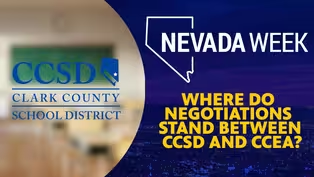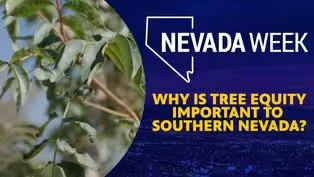
Teens speak out on major issues facing Nevadans
Clip: Season 6 Episode 10 | 7m 48sVideo has Closed Captions
Teens share their thoughts on education, mental health, social media, and other issues.
Teens from the Sun Youth Forum share their thoughts on education, mental health, social media, and other major issues.
Problems playing video? | Closed Captioning Feedback
Problems playing video? | Closed Captioning Feedback
Nevada Week is a local public television program presented by Vegas PBS

Teens speak out on major issues facing Nevadans
Clip: Season 6 Episode 10 | 7m 48sVideo has Closed Captions
Teens from the Sun Youth Forum share their thoughts on education, mental health, social media, and other major issues.
Problems playing video? | Closed Captioning Feedback
How to Watch Nevada Week
Nevada Week is available to stream on pbs.org and the free PBS App, available on iPhone, Apple TV, Android TV, Android smartphones, Amazon Fire TV, Amazon Fire Tablet, Roku, Samsung Smart TV, and Vizio.
Providing Support for PBS.org
Learn Moreabout PBS online sponsorship-The local newspaper The Las Vegas Sun held its 65th annual Sun Youth Forum this week.
The Forum's purpose is to bring awareness to what young people think about issues important to them.
And joining us now to do just that are Kiyoni McCarty-Crenshaw, a senior at Silverado High School; and Pedro Tapia Zamora, a senior at Advanced Technologies Academy.
Thank you both for joining Nevada Week.
First off, the previous segment to this we discussed the contract negotiations between the school district and the teachers union.
I'm wondering from each of you, I'll start with you, Pedro, how important is that topic to you?
Is it impacting you?
(Pedro Tapia Zamora) It's a very important topic.
I mean, here at Advanced Technologies Academy, my teachers, who usually do after school tutoring and after school clubs, have decided to cancel all that stuff in order to be in solidarity with the movement.
And it's very hard because the tutoring sessions are for rigorous classes that we have in my school, such as calculus, and it's very, it's very rough to see people who are in my position not be able to have the same resources and opportunities that I had.
So I find it very disheartening, and I hope to see a contract to be reached soon.
-Yeah.
The teachers have said, We are not going to stay before or after school longer than our contracted hours until this is agreed upon, until we can get a new contract.
Kiyoni, how is it impacting you, if at all?
(Kiyoni McCarty-Crenshaw) The same as Pedro at school, teachers of mine, most of our extracurricular and club activities are now being student-based because teachers refuse to stay and they don't want to do more than their contract requires them to any longer, because they are not being compensated.
It's also a personal issue for me because my mom works directly in the education field.
And she is also undergoing the problems that go along with this contract.
-Waiting to get a new contract?
-Yes.
-How does that impact you at home?
-I can tell she's very stressed about it.
So it makes me feel bad, because there's not very much I can do, being just a student myself and not in that sort of academic power.
That's really it.
-Okay.
Well, let's talk about being a student.
I got to moderate your room at the Sun Youth Forum, which covered teen topics.
And the biggest question that got the most discussion was, How has the COVID pandemic affected teenagers?
What kind of answers did you get?
-So a lot of our answers about COVID, most of the students who wanted to talk about how it impacted them directly and how it impacted their, mostly their ability to learn and their ability to socialize with other people.
Teenagers are now very socially isolated.
They no longer know how to interact with each other because of the year of the pandemic.
We were all stuck at home.
We were stuck only speaking to our families.
And for those with not the greatest families, they didn't have very many places to turn to.
So they became very social media dependent.
A lot of the-- a lot of the teenagers talked about how they experienced-- what they experienced is now making them notice more generational differences between them and the incoming freshmen and generational class, how they are so much more outgoing and they look different because they did not experienced the same things.
But then again, some of them are also more-- they've grown longer and faster than they should have.
-How did the COVID-19 pandemic force people to grow up faster?
-I guess it really-- it was in the way that we were forced to learn how to live in isolation.
We were forced to learn how to deal with such a big, impactful event that isn't just affecting us.
But we have to take care of ourselves.
And some of us, like myself, I actually did experience the virus.
So those of us that experienced such things and being scared because it was life threatening for a lot of people, it causes you to think differently.
It causes your mentality to develop a lot faster than the normal adolescent.
-Pedro, your topic was about living in Nevada.
And the biggest question you told me that everyone discussed was, What ways can Nevada improve its education systems to ensure a higher ranking nationwide?
How does Nevada improve its education ranking?
-Yeah.
So there's a lot of solutions that my group discussed.
And some of the solutions were that since we were in high school, we believe that there's not that much leniency in our schools.
We felt that there's a lot of pressure and strictness placed on us.
For example, someone pointed out the fact that there's a bathroom policy where you have to ask the teacher to go to the bathroom.
And they expect you to come back in a time of five minutes.
And we also had another student who was an exchange student from Europe, where they said directly and open, they said Europe does not have any of these policies, because the teachers believe that these students can be trusted.
But here in Vegas, there's that pre-mindset where we're not trusted.
So we believe that that pressure is not worth going to school for.
And that's something we also discussed was the absenteeism, where a lot of our students here in Vegas, specifically, aren't going to school.
And we did also discuss how some of that contributes to the transportation here in Vegas.
As we saw, there's a lot of construction, especially near my zoned school, which is by Alexander and Ferrell.
And because of that, a lot of students, a lot of students are getting late to school.
As a result, they're starting to feel that mindset of like, What's the point of going if I'm going to be late and missing half of my classes?
-So construction is preventing kids from getting to school.
Also, policies that you think are too stringent are keeping kids from wanting to go to school.
And so that's the solution you think, is improving just in attendance in order to get a national ranking improvement?
-Yes, 100%.
We believe that just improving the fact that if students can get to school and start to learn rather than being held back from all that, then our scores would rise significantly.
-Kiyoni, why are teens expected to decide on a career before they even have a chance to explore who they are?
-So this is a really big discussion for my group.
A lot of-- a lot of the teens in that room were very passionate about this subject.
And one of the major conclusions that we came to is because that is what was expected of all of the generations before us.
Our parents were expected to know what they were going to do.
And the educational system is-- the major goal is college.
That is what they're working towards in the end, but they don't think about the bigger picture of life and how there are students who don't want to go to college.
It isn't for them.
That is not the path they want to follow.
And so the educational system is setting those kids up for failure, because this is not their ultimate goal.
You are sending them into the world with no skills for what they can do, for what they would like to do.
-Pedro, I see you nodding.
What do you agree with specifically there?
-I just I agree with the fact that there's already that just expectation that you have to decide your career before you even turn 18, before you're a legal adult.
Also, you have to have in mind that you want this job and you'll stick with this job for the long term.
And then as you see, the studies show that people change their majors in college.
And then it causes a lot of financial issues because they have to switch majors and go to a different school or just area, in general.
-Kiyoni and Pedro, we could talk for a long time, but we have run out of time.
Thank you so much for joining Nevada Week.
-Thank you.
-Thank you for having us.
Where do negotiations stand between CCSD and CCEA?
Video has Closed Captions
Clip: S6 Ep10 | 5m 31s | Multiple schools have closed this week, citing a large number of teachers calling out. (5m 31s)
Why is Tree Equity Important to Southern Nevada?
Video has Closed Captions
Clip: S6 Ep10 | 12m 13s | What Tree Equity is, how it reduces heat, and why many neighborhoods trees. (12m 13s)
Providing Support for PBS.org
Learn Moreabout PBS online sponsorship
- News and Public Affairs

Top journalists deliver compelling original analysis of the hour's headlines.

- News and Public Affairs

FRONTLINE is investigative journalism that questions, explains and changes our world.












Support for PBS provided by:
Nevada Week is a local public television program presented by Vegas PBS

